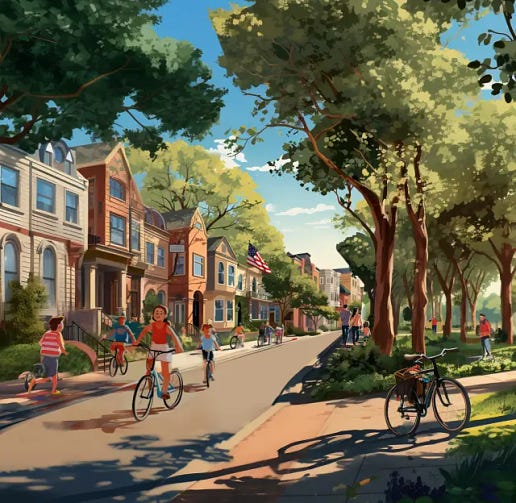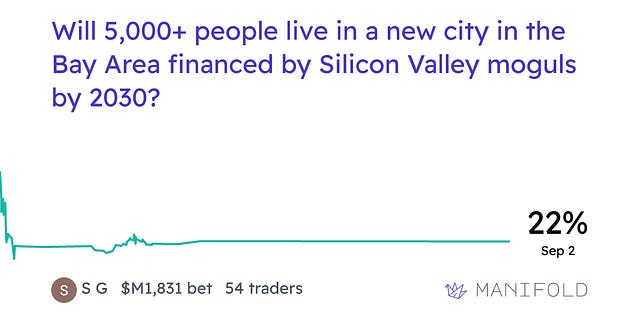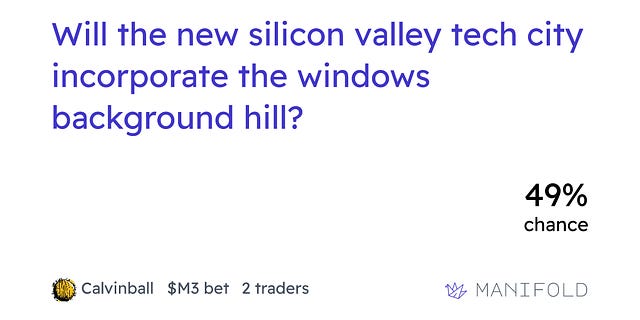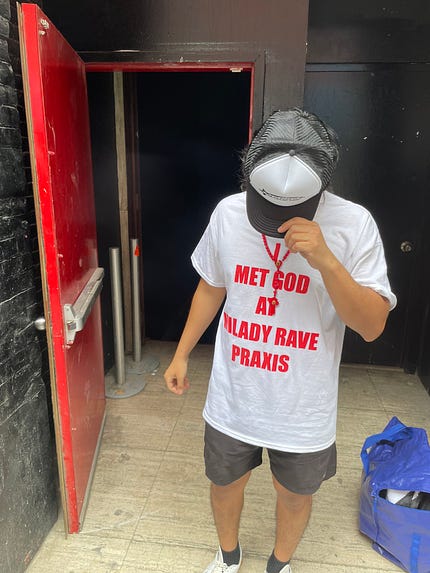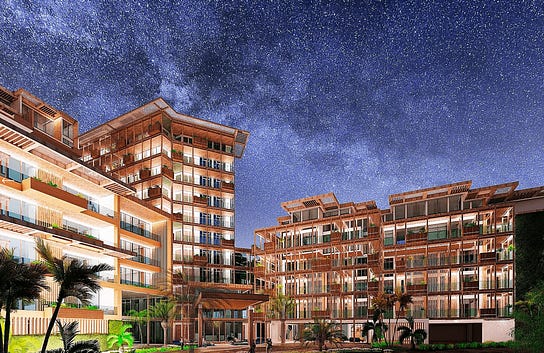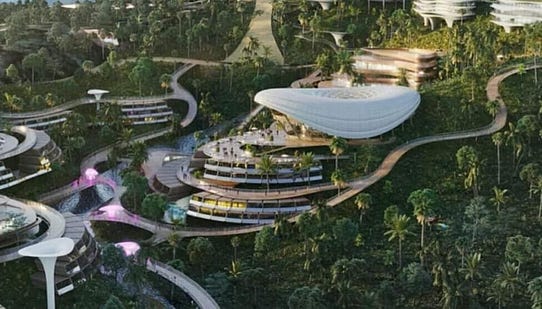Astral Codex Ten - Model City Monday 9/4/23
California Dreamin’Guardian: Silicon Valley Elites Revealed As Buyers Of $800 Million In Land To Build Utopian City. The specific elites include the Collison brothers, Reid Hoffman, Nat Friedman, and Marc Andreessen, led by the mysterious Jan Sramek. The specific land is farmland in Solano County, about an hour’s drive northwest of San Francisco. The specific utopian city is going to look like this:
The company involved (Flannery Associates aka California Forever) has been in stealth mode for several years, trying to buy land quietly without revealing how rich and desperate they are to anyone in a position to raise prices. Now they’ve released a website with utopian Norman-Rockwell-esque pictures, lots of talk about creating jobs and building better lives, and few specifics. My in-laws live just north of the area involved. I drive through there regularly. It’s hot, dry, and without a lot going on. There are a few ~100,000 person towns scattered across the county, usually a small core of shops surrounded by suburbs and strip malls. The culture and politics are about 30% of the way along the spectrum from Bay Area Democrats to Central Valley Republicans. Humans outnumber cows, but the cows make a strong showing.
Even for these tech tycoons, $800 million is a lot of money. So what’s the business plan? In one sense, nothing could be simpler. Buy lots of farmland cheap. Build housing for the housing-starved California masses. Once it’s a respectable-sized town, sell dear. If you can actually create a Norman Rockwell utopia, great. But Californians will also pay $750 per square foot for somewhere that just has a little less trash and feces than usual. So the bar is low. Some quick numbers: Flannery has bought about 78 square miles of land, but suppose they can only develop half of it for legal and environmental reasons. This would still make them the same size as the nearby towns of Vacaville (30 sqm) and Fairfield (40 sqm). Land value in Vacaville is about $75K per acre. So if they developed their land to the same level as Vacaville, it would be worth $4 billion. But in fact, they’re talking a lot about “walkable, liveable, sustainable communities”, all of which are code words for “dense”. If their town actually looks like the pictures (note the connected row houses with tiny yards) it could easily be $10 billion plus. That’s not even counting any benefit from the community actually being “utopian”.¹ In another sense, this is an extremely risky investment with a long and unclear path to profitability. You can make a killing selling housing in California because there’s constricted supply. There’s constricted supply for legal reasons. Building your own town solves some, but not all, of the legal problems. And it causes new legal problems of its own. Solano County has a so-called “Orderly Growth Measure” saying that new building should happen in existing cities and not on empty land. In order to start building at all, Flannery has to win a referendum granting an exemption. But they already have a powerful coalition of local enemies:
And if they defeat all these people and win the local election, anyone who is against them can still lodge the normal CEQA and NEPA objections that have gummed up most large building projects in California over the past fifty years. And if they defeat those, they still have to build the city. Rep. Garamendi is skeptical, saying³:
And if they manage that, what do they do about their own citizens? California allows a local government form called a “charter city”, but I don’t think you can get away with being actually undemocratic. So once 10,000 people live in their town, what’s to stop those people from becoming NIMBYs and voting against further growth? I assume there’s some answer to this question, since people have built successful company-owned planned cities in California in the past (eg Irvine). I’m just not sure what it is. Could their city charter ban zoning? Could they have some sort of super-powerful city manager paired with a very weak democratic council? Could they build everything first, and only invite people to move in after they’re done? Of course there are prediction markets: This is the only one with more than 15 traders, but go here to see the smaller ones; I’ll try to highlight them later if they get big enough to be credible. Also, some people asking the important questions: The Paradox Of PraxisYou can think of new city projects as existing on a spectrum: Usually the ones on the left are more fun to talk about, but the ones on the right are more fun to invest in. The paradox of Praxis is that to all appearances, they’re several miles off the left side of this graph. No amount of reading starry-eyed overly-ambitious Silicon Valley ad copy can prepare you for how over-the-top Praxis is. Praxis has a manifesto with phrases like “glory in death by a light brighter than a thousand suns" and "atrophied bodies submerged in gel, fed a synthetic bug paste". Praxis holds parties in classical-music-filled candlelit lofts where they ask participants about “Janusian thinking”. Praxis has a website www.terrifyingangel.com which is just a YouTube video on the idea of meaning throughout human history, plus a resignation letter you can send to your boss when you quit to join Praxis.
But the other half of the paradox is the constant rumors that they’re competent and have some kind of good plan. These are spoken only in hushed whispers, I don’t know the details. But in 2021, they raised $4 million in a seed round from well-regarded venture capitalists whose investments usually make money. In 2022 they raised another $15 million in a Series A round from . . . okay, partly from Sam Bankman-Fried and Three Arrows Capital, two notorious crypto scammers. But you would think scammers would be extra careful not to invest their own money in scams! Also, they recently signed on David Weinreb, a completely normal (and well-regarded) city planner person. What’s the strategy that both involves both Milady Raves and lots of competent people agreeing you’re a good investment? One strategy is something like: buy some land somewhere. Build some houses and streets. Convince digital nomads to move there on the grounds that you are very cool and visionary. Do some cool and visionary seeming things, or at least throw some really good raves. Other digital nomads get jealous and move there too. Sell parcels of land to these people, get rich, pay back your investors. And then who knows, maybe create a new civilization that redefines what it means to be human. Consider Elon Musk. Elon Musk is good at certain business-related skills. But that’s not the essence of Elon Musk. The essence of Elon Musk is that he’s a Visionary who can bring the Glorious Future. We know this because he’s a crazy person who says stuff that doesn’t really make sense. When Elon Musk buys a company, its value goes up - maybe partly because people expect Musk to make good business decisions, but also partly because now the company is part of Musk’s Glorious Future, and therefore exciting. Employees, customers, and investors all get excited and reinforce each other in a virtuous circle. And although Musk might not always accomplish the exact Glorious Future future he promises, his companies do well and make money, because having motivated employees, star-struck customers, and willing investors is a great combination. Elon Musk has an aura of destiny because he succeeded at his first several companies. Dryden Brown of Praxis Society, lacking a Paypal Mafia to join, is trying to hack together an aura of destiny out of raves and angel-related videos. So far it seems to be going pretty okay. Prospera Sues Honduras For 2/3 Of Its National BudgetTo refresh, in the mid-2010s Honduras’ pro-market government created ZEDEs - businesses that bought up unoccupied land could start their own districts with their own preferred legal system in exchange for bringing in investment. The government knew businesses wouldn’t invest long-term if the next government could just cancel the agreement and seize all of their stuff, so they fortified the law with as much protection as possible. It would take a long constitutional amendment process to repeal, and ZEDE investors might be able to object to any changes under international investment treaties. Lured by these protections, three companies started ZEDEs, including a big high-profile one called Prospera. In early 2022, a socialist government took power, and started trying their best to destroy the ZEDEs. They started the constitutional amendment process (they seem to think they’ve finished it, but a Prospera rep I talked to believe they have to hold another vote by the end of this year, something I see no signs of them doing) and have been harassing and stonewalling existing ZEDEs. One ZEDE, Orquidea, shut down immediately. A second, Ciudad Morazan, seems to still be operating but I cannot figure out exactly how or why. Prospera has been most vocal in its opposition, and sued Honduras for $11 billion in the World Bank’s court of investment arbitration. (Prospera has only spent about $100 million so far, so it’s unclear why they deserve 100x that in penalties. Also $11 billion is “two-thirds of the 2022 Honduran national budget”, and forcing Honduras to pay it would cause national catastrophe. This might be more of a highball offer than a number they actually expect to get.) This article (poorly translated from Spanish, sorry) has the most information. It suggests Honduras believes they signed onto the investment treaties “with reservations”, ie conditional on being allowed to do things like shut down ZEDEs, and that therefore the suit is meaningless and they will not defend themselves. Although the magazine mostly takes the Honduras government’s side, it suggests they didn’t actually sign on with reservations, that the country’s lawyers might just have no idea what they’re talking about, and that their bold strategy of refusing to defend themselves will not pay off. In contrast, Prospera has extremely prestigious lawyers specializing in exactly this area, so things aren’t looking good for the government. Honduras seems to recognize this and is threatening to withdraw from ICSID, the international investment treaty that governs such disputes. This wouldn’t be completely unprecedented - Venezuela, Bolivia, and Ecuador have also done this. But ICSID rules say that withdrawing from ICSID, while it might help prevent future cases against you, doesn’t cancel existing cases, and wouldn’t protect Honduras against Prospera’s claim. (How would ICSID collect against Honduras if they lost? I don’t know, but I assume the global financial order has some way to make your life worse if you defy it.) I think everyone is hoping Honduras realizes that cancelling a flourishing economic zone that’s bringing lots of investment into the country at no cost to them - just isn’t worth taking an $11 billion loss, cancelling international treaties, and scaring off future investment. But who knows how these people think? In other Prospera news:
Elsewhere In Model Cities1: Dubai to help set up free trade zone in Colombia? (speculative, I’ve heard nothing else about this and don’t know what it would involve) 2: Financial Times article on recent charter city developments in Africa. 3: Saudi Arabia’s bonkers megacity Neom “is seeking a $2.7 billion loan”. I notice I am confused - I thought that despite all of Neom’s disadvantages, its one unquestionable advantage was that it was backed by the Saudi state who were willing to spend upwards of $1 trillion on it. So why do they need a $2.7 billion loan? 4: New Substack Vanguard Anthology on the Danish anarchist “free city” of Christiania. I visited when I was in Copenhagen, I mostly remember it being dirty and hard to navigate. 5: France offers to sell Kerguelen Island, a frozen wasteland near Antarctica approximately the size of Crete, for the low, low cost of only $60 billion. Great opportunity for any multibillionaire who wants to play king and is willing to deal with a fixer-upper. Might be an especially good match for Elon Musk, who has already demonstrated willingness to spend 11-figure sums on horrible places that it will ruin his life to own.
1 I don’t know if this is the right way to think about things; it’s assuming that Flannery’s costs and profits both come mainly from land, and developers bear the costs and get the profits of buildings. But maybe that’s not the plan. 2 I wondered why that name seemed so familiar before remembering I used it for a minor character in Unsong, who was based off the Biblical character Bildod from Job 2:11. Bildod falsely accuses Job of being wicked, for which God condemns him and demands he make a compensatory sacrifice. This is not a coincidence because nothing is ever a coincidence. 3 See footnote 1. Flannery has spent $800 million. Eyeballing the sizes of the fortunes involved, the backers don’t have $8 billion to spend on further development, but I expect other investors will be happy to bear the cost of development once they’ve proven this is really going to happen. You're currently a free subscriber to Astral Codex Ten. For the full experience, upgrade your subscription. |
Older messages
Open Thread 292
Monday, September 4, 2023
...
Your Book Review: Zuozhuan
Friday, September 1, 2023
Finalist #16 in the Book Review Contest
Hidden Open Thread 291.5
Thursday, August 31, 2023
...
Here's Why Automaticity Is Real Actually
Thursday, August 31, 2023
...
Highlights From The Comments On Fetishes
Wednesday, August 30, 2023
...
You Might Also Like
We Tried All the Jeans at Gap
Tuesday, March 11, 2025
Plus: What Kristen Kish can't live without. The Strategist Every product is independently selected by editors. If you buy something through our links, New York may earn an affiliate commission.
What Happened To NAEP Scores?
Tuesday, March 11, 2025
... ͏ ͏ ͏ ͏ ͏ ͏ ͏ ͏ ͏ ͏ ͏ ͏ ͏ ͏ ͏ ͏ ͏ ͏ ͏ ͏ ͏ ͏ ͏ ͏ ͏ ͏ ͏ ͏ ͏ ͏ ͏ ͏ ͏ ͏ ͏ ͏ ͏ ͏ ͏ ͏ ͏ ͏ ͏ ͏ ͏ ͏ ͏ ͏ ͏ ͏ ͏ ͏ ͏ ͏ ͏ ͏ ͏ ͏ ͏ ͏ ͏ ͏ ͏ ͏ ͏ ͏ ͏ ͏ ͏ ͏ ͏ ͏ ͏ ͏ ͏ ͏ ͏ ͏ ͏ ͏ ͏ ͏ ͏ ͏ ͏ ͏ ͏ ͏ ͏ ͏ ͏ ͏ ͏ ͏ ͏ ͏ ͏ ͏ ͏
What A Day: Police state school
Monday, March 10, 2025
A student organizer at Columbia University was arrested by ICE. It's a scary sign for students and colleges for the next four years. ͏ ͏ ͏ ͏ ͏ ͏ ͏ ͏ ͏ ͏ ͏ ͏ ͏ ͏ ͏ ͏ ͏ ͏ ͏ ͏ ͏ ͏ ͏ ͏ ͏ ͏ ͏ ͏ ͏ ͏ ͏ ͏
Can Anything Stop Bird Flu?
Monday, March 10, 2025
March 10, 2025 HEALTH Can Anything Stop Bird Flu? By Christopher Cox Illustration: David Macaulay In February 2024, dairy farmers in the northwest corner of the Texas Panhandle noticed that their herds
Going to the Mattresses
Monday, March 10, 2025
Investment Advice, Protest Arrest ͏ ͏ ͏ ͏ ͏ ͏ ͏ ͏ ͏ ͏ ͏ ͏ ͏ ͏ ͏ ͏ ͏ ͏ ͏ ͏ ͏ ͏ ͏ ͏ ͏ ͏ ͏ ͏ ͏ ͏ ͏ ͏ ͏ ͏ ͏ ͏ ͏ ͏ ͏ ͏ ͏ ͏ ͏ ͏ ͏ ͏ ͏ ͏ ͏ ͏ ͏ ͏ ͏ ͏ ͏ ͏ ͏ ͏ ͏ ͏ ͏ ͏ ͏ ͏ ͏ ͏ ͏ ͏ ͏ ͏ ͏ ͏ ͏ ͏ ͏ ͏ ͏ ͏ ͏ ͏ ͏ ͏ ͏ ͏
Rocket’s $1.75B deal to buy Redfin amps up competition with Zillow
Monday, March 10, 2025
GeekWire Awards: Vote for Next Tech Titan | Amperity names board chair ADVERTISEMENT GeekWire SPONSOR MESSAGE: A limited number of table sponsorships are available at the 2025 GeekWire Awards: Secure
🤑 Money laundering for all (who can afford it)
Monday, March 10, 2025
Scammers and tax evaders get big gifts from GOP initiatives on crypto, corporate transparency, and IRS enforcement. Forward this email to others so they can sign up 🔥 Today's Lever story: A bill
☕ Whiplash
Monday, March 10, 2025
Amid tariff uncertainty, advertisers are expecting a slowdown. March 10, 2025 View Online | Sign Up Marketing Brew Presented By StackAdapt It's Monday. The business of sports is booming! Join top
☕ Splitting hairs
Monday, March 10, 2025
Beauty brand loyalty online. March 10, 2025 View Online | Sign Up Retail Brew Presented By Bloomreach Let's start the week with some news for fans of plant milk. A new oat milk, Milkadamia Flat
Bank Beliefs
Monday, March 10, 2025
Writing of lasting value Bank Beliefs By Caroline Crampton • 10 Mar 2025 View in browser View in browser Two Americas, A Bank Branch, $50000 Cash Patrick McKenzie | Bits About Money | 5th March 2025
